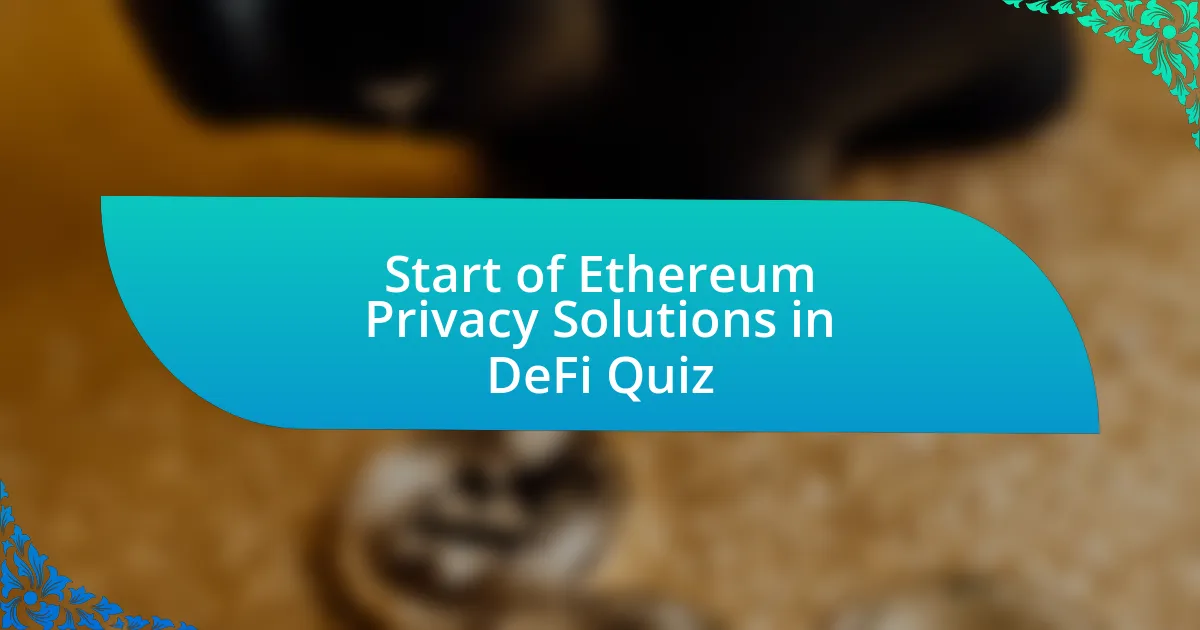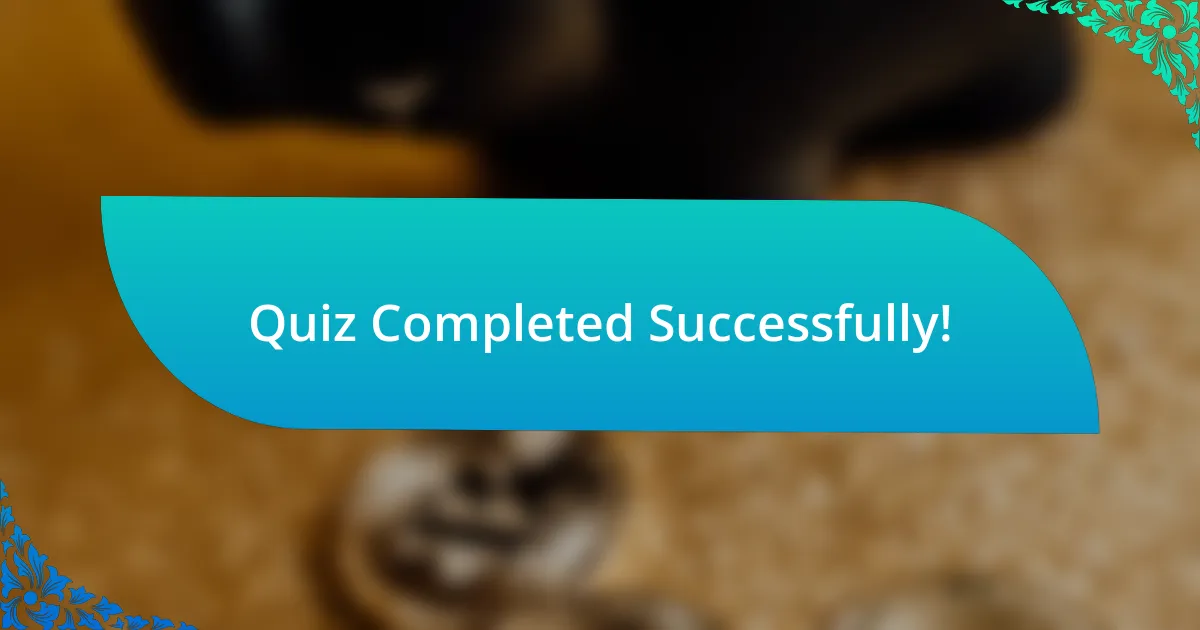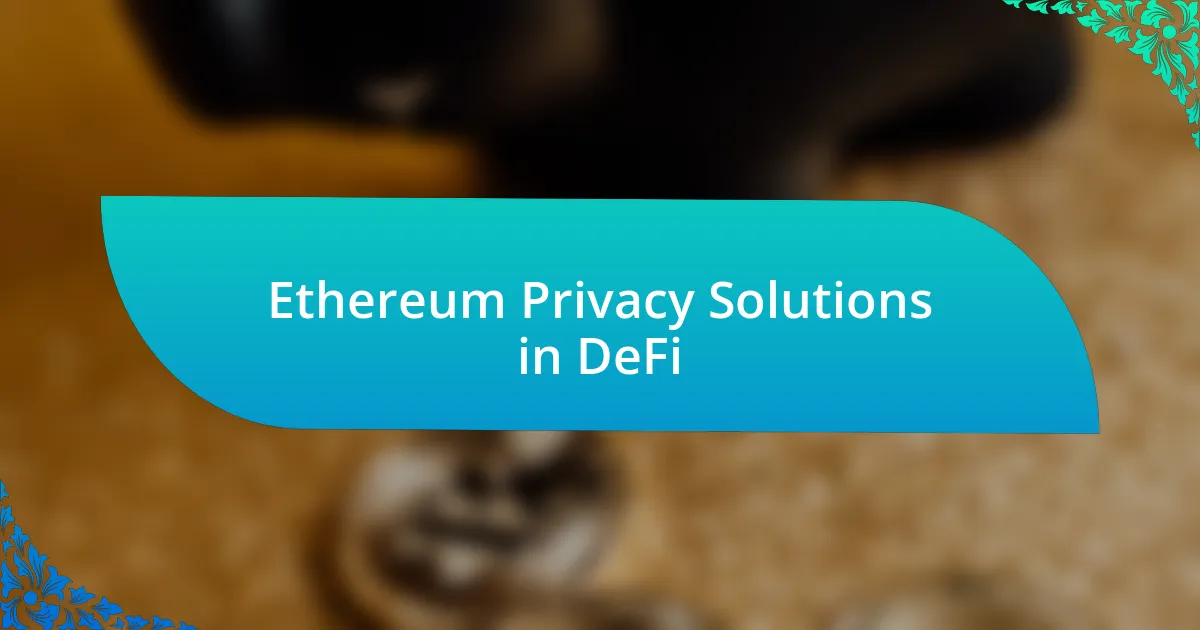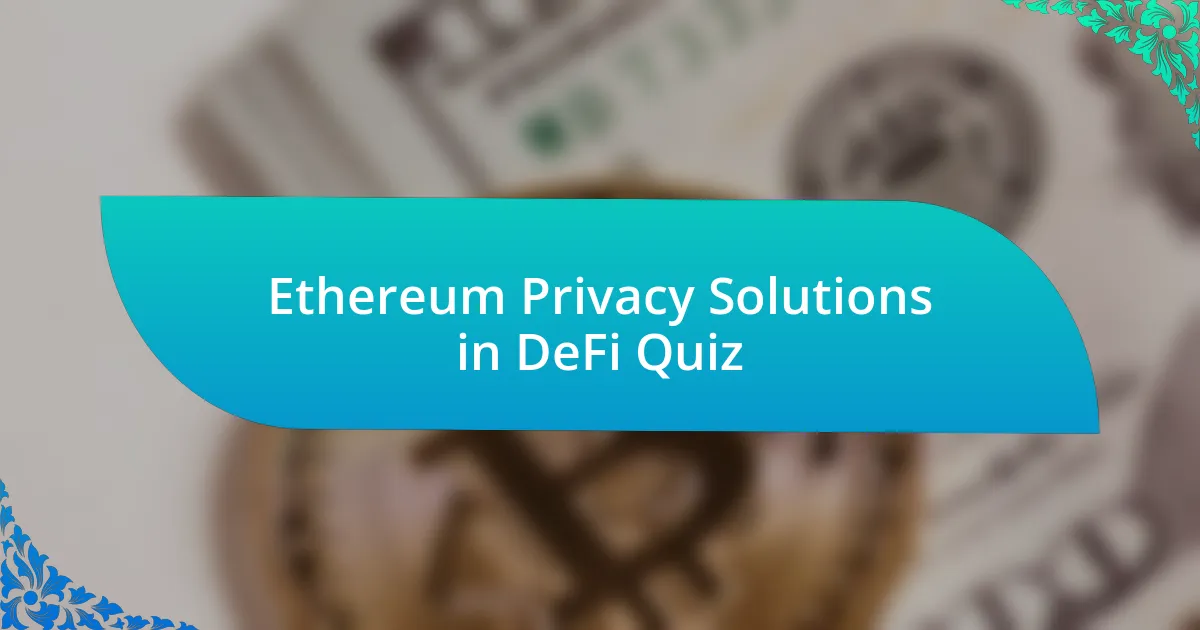
Start of Ethereum Privacy Solutions in DeFi Quiz
1. What is the primary concern about privacy in DeFi?
- The complex regulatory requirements that limit user participation.
- The limited availability of financial assets on decentralized platforms.
- The openness of blockchain technology, which allows anyone to see all transactions on public blockchains.
- The high transaction fees associated with using DeFi platforms.
2. What technology is used to protect user data in DeFi?
- Zero-Knowledge Proofs (ZKPs)
- Tokenization
- Smart Contracts
- Distributed Ledgers
3. How do Zero-Knowledge Proofs work in DeFi?
- By creating a `proof` that can be checked without showing the actual data, allowing users to do business privately while keeping the blockchain`s decentralized nature.
- By using multisignature wallets to authorize transactions requiring multiple approvals from different parties.
- By eliminating the need for third-party verification services, thus streamlining the transaction process entirely.
- By encrypting all transaction data and only allowing authorized parties to view it, ensuring a secure ledger.
4. Which blockchain uses zk-SNARKs for privacy?
- Zcash
- Litecoin
- Bitcoin
- Ethereum
5. What is Tornado Cash, and how does it work?
- Tornado Cash is a social media platform for sharing cryptocurrency news and updates.
- Tornado Cash is a decentralized, non-custodial privacy solution that mixes assets in a pool, making it hard to find certain assets and their original wallet.
- Tornado Cash is a blockchain game that rewards users with tokens for playing.
- Tornado Cash is a centralized exchange that allows users to buy and sell cryptocurrencies.
6. What is Railgun, and how does it enhance privacy in DeFi?
- Railgun is a centralized exchange that offers high-frequency trading and market analytics.
- Railgun is a social media platform designed specifically for cryptocurrency discussions and promotions.
- Railgun is a privacy system designed for Ethereum that uses zk-SNARKs to shield users’ wallet balances and transactions.
- Railgun is a blockchain game that rewards users for playing and winning tournaments.
7. What is Panther Protocol, and what does it offer?
- Panther Protocol is a decentralized exchange that only operates on Ethereum, focusing on transparency.
- Panther Protocol offers identity verification for users wanting to trade anonymously on public blockchains.
- Panther Protocol is a wallet service that encrypts all user data across different platforms.
- Panther Protocol protects DeFi`s privacy across multiple blockchains by allowing users to mint private assets known as zAssets, which are collateralized 1:1 by the original token.
8. How does DeFi Technologies enhance its trading desk with zero-knowledge proofs?
- DeFi Technologies improves operations through increased public blockchain visibility and transparency.
- DeFi Technologies integrates zero-knowledge proof tools to boost operations on the Solana and Ethereum blockchains.
- DeFi Technologies relies on traditional encryption methods to secure its trading desk’s performance.
- DeFi Technologies enhances its trading desk by applying artificial intelligence to all transactions.
9. What is the purpose of integrating zero-knowledge proof technology into DeFi Alpha?
- To create a completely anonymous trading environment without any oversight.
- To refine DeFi Alpha’s capacity for spotting low-risk arbitrage opportunities, enhance transaction privacy, and boost operational efficiency.
- To eliminate all regulatory requirements for DeFi operations entirely.
- To reduce transaction fees and increase network speed significantly.
10. What is Aztec Network, and what does it offer in terms of privacy solutions?
- Aztec Network is a centralized exchange for trading digital assets.
- Aztec Network is a social media platform for sharing cryptocurrency news.
- Aztec Network is the first private zk-rollup on Ethereum, enabling decentralized applications to access privacy and scale.
- Aztec Network is a hardware wallet that stores cryptocurrencies offline.
11. What is the significance of zero-knowledge rollups in Ethereum?
- Zero-knowledge rollups solely focus on reducing transaction fees.
- Zero-knowledge rollups eliminate the need for off-chain verification.
- Zero-knowledge rollups enhance Ethereum`s transaction capacity while maintaining security.
- Zero-knowledge rollups decrease overall transaction speed on Ethereum.
12. What are the key properties of zero-knowledge proofs?
- Completeness, soundness, and zero-knowledge.
- Accessibility, usability, and scalability.
- Encryption, verification, and trust.
- Transparency, security, and authentication.
13. How does verifiable computation work with zero-knowledge proofs?
- Verifiable computation only involves showing all data transparently to all users.
- Verifiable computation requires all transactions to be processed on-chain without any proofs.
- Verifiable computation involves executing transactions off-chain and submitting zero-knowledge proofs to prove the correctness of off-chain execution.
- Verifiable computation works by manually verifying each transaction without cryptographic methods.
14. What is the role of zk.money in Aztec Network’s privacy solution?
- zk.money is a marketplace for NFT trading only.
- zk.money is a DeFi aggregator for private transactions.
- zk.money is a lender for high-interest loans in DeFi.
- zk.money is a trading platform for public transactions.
15. How does Panther Protocol meet compliance needs of financial institutions?
- Panther Protocol removes all transaction details to ensure anonymity for users.
- Panther Protocol requires financial institutions to disclose all user data for auditing purposes.
- Panther Protocol only focuses on enhancing transaction speeds without any compliance features.
- Panther Protocol offers both privacy and auditability, making it suitable for institutional use in DeFi.
16. What is the significance of zk-SNARKs in DeFi privacy solutions?
- zk-SNARKs provide scalable privacy for transactions in DeFi.
- zk-SNARKs improve transaction speed by removing all privacy measures.
- zk-SNARKs ensure all transactions are public on the blockchain.
- zk-SNARKs are a method for mining cryptocurrencies more efficiently.
17. How does Railgun integrate with popular DeFi platforms?
- Railgun automatically converts users` assets to stablecoins for integration.
- Railgun connects to Bitcoin to enhance secure payments.
- Railgun works only with centralized exchanges for trading services.
- Railgun integrates with platforms like Uniswap and SushiSwap for private trading.
18. What is the primary advantage of using zero-knowledge proofs in DeFi?
- It decreases the transaction fees on every trade.
- It makes all transactions visible to everyone on the network.
- It allows for private transactions that are in line with regulations.
- It eliminates the need for smart contracts in DeFi.
19. How does DeFi Technologies plan to leverage zero-knowledge index Exchange-Traded Products (ETPs)?
- DeFi Technologies will eliminate all transaction fees for users by using zero-knowledge index ETPs.
- DeFi Technologies plans to develop new financial products like zero-knowledge index ETPs using Zero Computing’s technology.
- DeFi Technologies aims to restrict access to zero-knowledge index ETPs only for institutional investors.
- DeFi Technologies intends to create a centralized exchange with zero-knowledge index ETPs.
20. What is the expected impact of integrating zero-knowledge proof technology on DeFi Alpha’s trading strategies?
- The integration will focus solely on enhancing marketing strategies, neglecting trading operations completely.
- The integration will lead to a decrease in transaction speeds, reducing trading efficiency for DeFi Alpha.
- The integration is expected to increase the security and sophistication of DeFi Alpha’s trading strategies by optimizing its ability to identify and execute arbitrage opportunities.
- The integration is predicted to eliminate all trading risks for DeFi Alpha, ensuring guaranteed profits.
21. What is the significance of expanding verifiable computation to Solana?
- Expanding verifiable computation to Solana enables off-chain execution of complex computations with on-chain verification, advancing ZKPs across various blockchain ecosystems.
- Expanding verifiable computation to Solana improves the speed of transaction confirmations without affecting privacy.
- Expanding verifiable computation to Solana increases transaction fees for users across all blockchains.
- Expanding verifiable computation to Solana limits the use of ZKPs to private transactions only on Solana.
22. How does Aztec Connect enable private DeFi on Ethereum mainnet?
- Aztec Connect relies solely on alternative privacy chains for DeFi transactions.
- Aztec Connect only provides privacy for layer-2 scaling solutions on Ethereum.
- Aztec Connect limits DeFi access to users from selected countries.
- Aztec Connect fuses full privacy and L1 DeFi liquidity right on Ethereum mainnet.
23. What is the role of zero-knowledge rollups in providing secure scalability?
- Zero-knowledge rollups are used to increase the speed of transactions on a single chain only.
- Zero-knowledge rollups function solely by compressing on-chain data to reduce storage costs.
- Zero-knowledge rollups allow all transaction data to be publicly visible for transparency.
- Zero-knowledge rollups execute transactions off-chain and submit proofs for verification on Ethereum, enabling secure scalability.
24. What are the benefits of using Panther Protocol in DeFi?
- Enhancing interoperability with traditional finance.
- Protecting DeFi`s privacy across multiple blockchains.
- Increasing trading volume on centralized exchanges.
- Reducing transaction fees across all networks.
25. How does Tornado Cash break the on-chain link between recipient and destination addresses?
- By verifying transactions through multi-signature wallets
- By mixing assets in a pool
- By encrypting all recipient addresses
- By storing data on a centralized server
26. What is the significance of Railgun’s integration with major DeFi protocols?
- The integration enables users to privately trade assets without exposing their transaction history, bolstering Railgun’s position as a leading privacy tool in DeFi.
- The integration focuses on reducing gas fees for all DeFi transactions, prioritizing cost-effectiveness.
- The integration emphasizes the creation of new tokens, expanding the asset variety available on DeFi platforms.
- The integration allows users to view all transactions on public blockchains, enhancing transparency.
27. How does DeFi Technologies plan to develop new financial products using zero-knowledge proof technology?
- DeFi Technologies will introduce a decentralized exchange for traditional assets.
- DeFi Technologies intends to develop stablecoins utilizing smart contracts.
- DeFi Technologies plans to create zero-knowledge index ETPs using Zero Computing’s technology.
- DeFi Technologies aims to issue new types of NFTs for digital art trading.
28. What is the expected growth of ZKP-based applications in the crypto community?
- The crypto community expects ZKP-based applications to grow slowly because of a lack of interest in privacy solutions.
- The crypto community expects ZKP-based applications to grow quickly as more advanced privacy solutions are sought.
- The crypto community is predicted to see a decline in ZKP-based applications due to regulatory pressures.
- The crypto community anticipates a stagnant growth of ZKP-based applications with no significant changes.
29. How does Aztec Network’s zk.money aggregator enhance user experience?
- Allows users to interact with DeFi apps privately with lower costs.
- Provides aggregate data for market analysis and trends.
- Increases transaction speeds for all blockchain activities.
- Enhances user experience by offering more trading pairs.
30. What is the significance of verifiable computation in expanding ZKPs across blockchain ecosystems?
- Verifiable computation increases transaction fees by requiring more resources and time to process each transaction.
- Verifiable computation creates public ledgers that cannot be altered, ensuring transparency in all transactions across blockchains.
- Verifiable computation enables off-chain execution of complex computations with on-chain verification, advancing ZKPs across various blockchain ecosystems.
- Verifiable computation eliminates the need for smart contracts, simplifying the blockchain`s operational framework.

Quiz Completed Successfully!
Congratulations on completing the quiz on Ethereum Privacy Solutions in DeFi! You’ve taken a significant step in understanding a crucial aspect of the decentralized finance ecosystem. We hope you found the questions insightful and the process enjoyable. It’s a fascinating area that blends technology with privacy, and you’ve likely learned about various protocols and techniques aimed at enhancing user confidentiality on the blockchain.
Throughout the quiz, you may have discovered the importance of privacy in DeFi, particularly as it relates to safeguarding user transactions from surveillance. Understanding concepts like zero-knowledge proofs and other privacy-centric protocols is vital in a world where data security is increasingly important. These insights are not just academic; they have practical applications that can influence your engagement with blockchain technologies.
Now that you have completed the quiz, we encourage you to continue your learning journey. Check out the next section on this page, which provides in-depth information about Ethereum Privacy Solutions in DeFi. This material will expand on the concepts you’ve learned and provide you with a broader understanding of how privacy impacts the DeFi landscape. Happy learning!

Ethereum Privacy Solutions in DeFi
Overview of Ethereum and DeFi
Ethereum is a decentralized platform that enables smart contracts and decentralized applications (dApps). It serves as the backbone for decentralized finance (DeFi), which offers financial services without central authorities. DeFi includes lending, borrowing, and trading services, typically through automated protocols. With increasing adoption, the need for privacy solutions in DeFi on Ethereum has grown significantly. Users seek to protect their financial activities and personal information while using these platforms.
Importance of Privacy in Decentralized Finance
Privacy in decentralized finance is crucial for maintaining user confidentiality and protecting sensitive data. Without privacy, users expose their transactions and financial positions to public scrutiny. This transparency can deter individuals from using DeFi services, particularly those engaging in large transactions or trading sensitive assets. Privacy enhances trust in DeFi, allowing for broader participation while minimizing risks associated with data breaches or on-chain analysis.
Privacy Solutions for Ethereum in DeFi
Various privacy solutions exist for Ethereum to enhance anonymity in DeFi. Zero-knowledge proofs (ZKPs) are a prominent method, enabling users to prove knowledge of information without revealing the information itself. Another approach includes Confidential Transactions, which obfuscate transaction amounts. Layer 2 solutions, like zkRollups, can also improve privacy while scaling Ethereum. These solutions integrate with DeFi protocols, ensuring private transactions while preserving the decentralized ethos.
Popular Privacy Projects in Ethereum DeFi
Several projects have emerged as leaders in providing privacy solutions in Ethereum DeFi. Tornado Cash enables users to mix Ether and ERC-20 tokens, enhancing transaction anonymity. Aztec Protocol utilizes zero-knowledge technology to enable private transactions. Secret Network integrates private smart contracts, allowing developers to create DeFi applications with confidentiality. These projects aim to give users control over their data and enhance the privacy of their financial activities.
Challenges and Limitations of Ethereum Privacy Solutions
Despite advancements, Ethereum privacy solutions face notable challenges. Regulatory scrutiny is a significant concern, with efforts to ensure compliance potentially compromising user anonymity. Additionally, the complexity of integrating privacy technologies into existing DeFi protocols presents technical hurdles. User education is also vital, as many users may be unaware of how to utilize privacy features effectively. These limitations can hinder widespread adoption and the full realization of privacy in DeFi.
What are Ethereum privacy solutions in DeFi?
Ethereum privacy solutions in DeFi refer to technological frameworks and protocols designed to enhance user privacy while engaging in decentralized finance activities on the Ethereum blockchain. These solutions aim to anonymize transactions and protect user data from public exposure. For instance, zk-SNARKs (zero-knowledge succinct non-interactive arguments of knowledge) are utilized to verify transactions without revealing the underlying data. Additionally, protocols like Tornado Cash offer privacy by allowing users to mix their funds, obscuring the connection between sender and receiver.
How do Ethereum privacy solutions improve user security?
Ethereum privacy solutions improve user security by obfuscating transaction details and user identities, thereby reducing the risk of surveillance and targeted attacks. By using cryptographic techniques, such as zk-SNARKs, users can prove the validity of their transactions without disclosing amounts or addresses. For example, this minimizes the exposure of users to front-running attacks, where malicious actors exploit public transaction data. Such enhancements create a safer environment for participants in DeFi ecosystems.
Where can users find Ethereum privacy solutions?
Users can find Ethereum privacy solutions within decentralized finance platforms and protocols that specifically integrate privacy features. Projects such as Tornado Cash, Aztec, and the Secret Network provide ways to transact with enhanced privacy. These solutions typically exist on decentralized platforms accessible through Ethereum wallets, allowing users to engage with them directly. Furthermore, various blockchain explorers provide insights into these privacy protocols, illustrating their operational mechanisms.
When were Ethereum privacy solutions developed?
Ethereum privacy solutions began to emerge significantly around 2016 with the introduction of zk-SNARKs through the Zcash protocol, which later inspired Ethereum-based implementations. Over the years, projects like Tornado Cash launched in 2019 and Aztec Protocol in 2020 further advanced privacy features tailored for DeFi. The development of these solutions has continued to evolve rapidly, responding to the growing demand for privacy in asset management and trading on Ethereum.
Who develops Ethereum privacy solutions?
Ethereum privacy solutions are developed by a combination of independent developers, startups, and established blockchain organizations. Teams such as those behind Tornado Cash and Aztec Protocol consist of engineers and cryptography experts focused on enhancing privacy within DeFi. Research institutions and community contributors also play roles in advancing cryptographic techniques and improving the implementation of privacy protocols on Ethereum.

